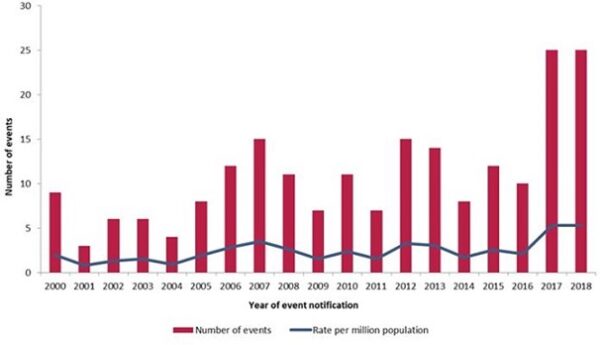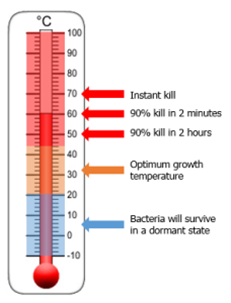Legionella: Management & Control
What is Legionnaires’ disease and what are the health effects?
Legionnaires’ disease is a type of pneumonia which can cause serious illness, particularly in those with underlying health conditions, smokers and men aged over 50 years. It was first recognized in 1976 following an outbreak at the annual convention of the American Legion held in the Bellevue Stratford Hotel in Philadelphia. The outbreak resulted in 34 deaths. The bacterium identified to have caused the disease was named Legionella pneumophila.
The main infection route of the illness is the inhalation of aerosols (small water droplets) carrying Legionella. The risk of exposure increases when water containing Legionella becomes broken up by impact with surfaces, or by devices creating a spray of droplets. i.e. showers. Symptoms of Legionnaires’ disease includes a dry cough, tiredness, chest pains and difficulty breathing. Other mild forms of the disease are known as Pontiac Fever and Lochgoilhead Fever.
Subsequent to the outbreak in 1976, cases of Legionella have increased globally. Some reasons for this may include; the increase use of different water systems such as spas and Jacuzzis; an improved detection rate; increase in use of green technologies such as greywater and solar panels; and most notably poor management of water systems. According to the HPSC, Legionellosis is a notifiable disease in Ireland meaning cases of Legionella infections are to be reported to the Medical Officer of Health(MOH)/Director of Public Health (DPH). Events of Legionnaires’ disease reported by HPSC from 2000-2018 can be seen in Figure 1.

Figure 1: HPSC Reported events of Legionnaires’ Disease / Legionellosis 2000 – 2018
A noteworthy case in Ireland occurred in 2015 in which a woman had contracted Legionnaires’ disease after staying in hotel and spa facility based in Kerry. In 2020, RTE news reported the source of the exposure to Legionella was due to a cold spa pool. The woman had suffered life changing injuries due to the illness including chronic fatigue. The case was investigated by the Health Service Executive and Health and Safety Authority and significant improvements were required by the facility. This case highlights the legal obligation on employers to manage and control the risk of Legionella.
What does the legislation cover?
In Ireland, the principle occupational health and safety legislation in controlling Legionnaires’ disease include:
- Safety, Health and Welfare at Work Act 2005 (No.10 of 2005)
- Safety, Health and Welfare at Work (General Application) Regulations 2007 (S.I. No.299 of 2007)
- Safety, Health and Welfare at Work (Biological Agents) Regulations 2013 (S.I. No.572 of 2013.)
- Safety, Health and Welfare at Work (Chemical Agents) Regulations, 2001 (S.I. No.619 of 2001)
Under Section 19 of the Safety, Health and Welfare at Work Act 2005, employers and those who control workplaces are required to carry out risk assessments. This would cover the assessment and control of the risks associated with Legionella in water systems.
In addition to legislative requirements, the Health Protection Surveillance Centre (HPSC) have published a guidance document on assessing, managing, and controlling the risks of Legionella in water systems. The document can be found here. The UK Health and Safety Executive (HSE) Approved Code of Practice (L8) and Technical Guidance (HSG 274) on the control of Legionella are also useful guides to industry best practice, and are available online here.
What are the sources of Legionella and how is the risk created?
The most common sources of Legionella include:
- Cooling towers – responsible for most outbreaks.
- Any type of domestic hot and cold water systems.
- Emergency shower heads and showers.
- Industrial processes that operate between 20 and 45 °C (refer to risk factors below) and can create aerosol droplets.
- Taps and water storage tanks.
- Spa and whirl-pool baths.
Some of the risk factors for proliferation of Legionella in water systems include:
- Temperature of water systems between 20 and 45 °C. Figure 2 displays the effect of temperature on Legionella growth.
- Source of nutrients to allow growth such as rust, lime scale and any other organic matter.
- Water stagnation in tanks and pipework, allowing the stored water to reach room temperature and proliferation of bacterial growth.
- Growth of biofilms in systems such as cold water tanks. Legionella is known as a sessile bacterium that can form as a biofilm. This allows a habitat for the growth and release of bacteria.

Figure 2: Temperature and Growth of Legionella
Employers have a legal obligation to identify and assess the sources and risks factors of Legionella. This involves carrying out a Legionella Risk Assessment.
What is a Legionella Risk Assessment (LRA)?
A LRA is a detailed document outlining the findings from undertaking a survey of the entire water system in the building and/or premises.
The objectives of conducting a LRA include:
- Identifying and assessing likely sources of risk
- Recommending schemes to help control the risk
- Suggesting a suitable routine monitoring program
- Clarifying lines of responsibility
- Identifying training deficiencies
- Providing recommendations
To meet the objectives of the survey, the following areas may be inspected:
- Visual inspection of plant to identify sources of contamination or physical deficiencies.
- Temperature measurements
- Review of current control measures.
LRAs should be carried out by experienced and competent personnel. The control measures must be reviewed regularly to remain effective.
Occupli’s Legionella Risk Assessment programme has been developed in accordance with:
- Health Protection Surveillance Centre (HPSC), National Guidelines for the Control of Legionellosis in Ireland, 2009
- UK HSE ‘Legionnaires’ Disease – The control of legionella bacteria in water systems – Approved Code of Practice & guidance’ (L8)
- UK HSE ‘Legionnaires’ Disease – Technical Guidance’ (HSG 274 Parts 1 – 3)
Occupli provides Legionella Risk Assessments to our clients all over Ireland. If you require further information or assistance please contact us via email at info@occupli.com, by phone at 0818 315 415.

